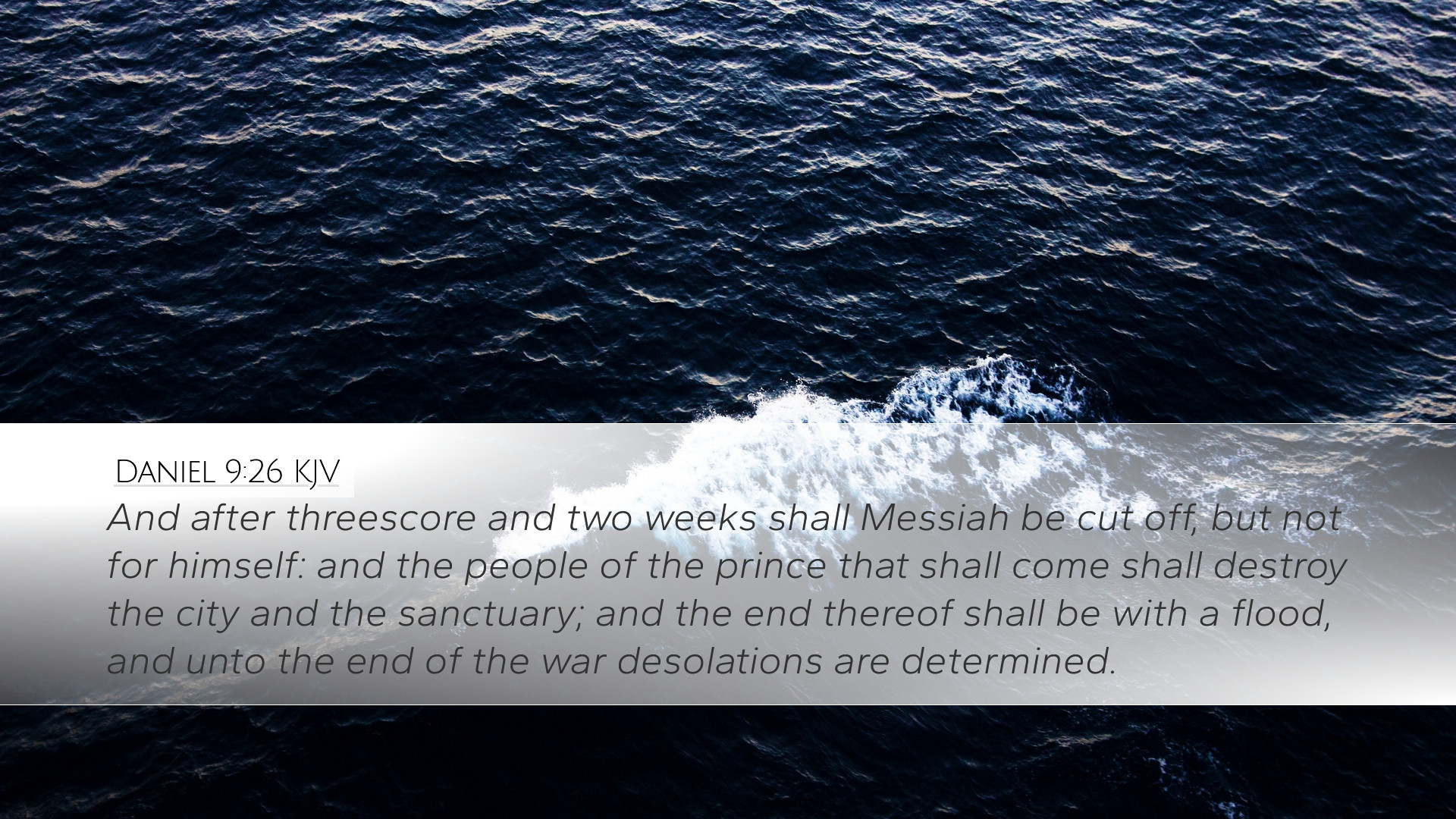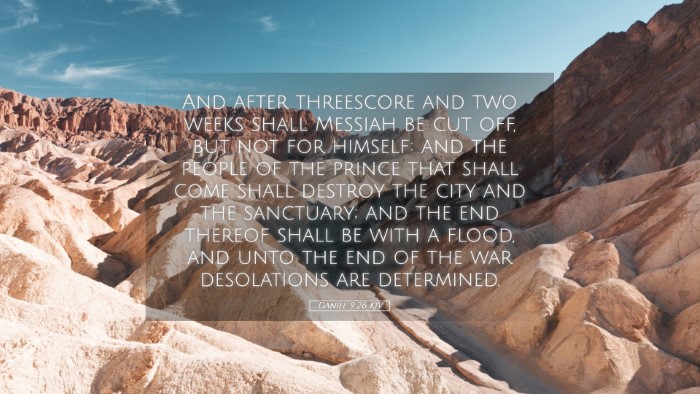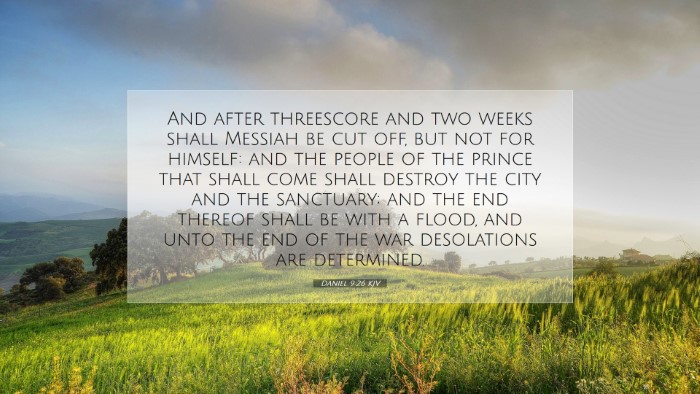Commentary on Daniel 9:26
The verse from Daniel 9:26 states: "And after threescore and two weeks shall Messiah be cut off, but not for himself: and the people of the prince that shall come shall destroy the city and the sanctuary; and the end thereof shall be with a flood, and unto the end of the war desolations are determined." This verse holds significant prophetic implications and serves as a cornerstone for understanding the timeline of the coming Messiah and the associated events within biblical eschatology. Below, we summarize insights from notable public domain commentaries to provide a comprehensive understanding of this passage.
Understanding the Context
Daniel 9 is a pivotal chapter in the book of Daniel, centering on prayer, confession, and prophecy. Daniel’s prayer in the earlier verses reveals his deep concern for Jerusalem and his awareness of the prophesied duration of the Babylonian captivity. The angel Gabriel’s response contains profound revelations about the timeline of Israel's deliverance and the coming of the Messiah.
The Timing of the Messiah
- Matthew Henry: In his commentary, Henry expounds on the term "threescore and two weeks," representing the period leading to the Messiah's appearance. He highlights that the seventy weeks denote a divinely ordained timeline, the culmination of which signifies a turning point in redemptive history.
- Albert Barnes: Barnes contextualizes this verse within the prophetic timeline, asserting that after the 62 weeks, the Messiah's arrival and subsequent "cutting off" indicate not only His death but also the sacrificial nature of His mission. The reference to the Messiah being "cut off" speaks profoundly to the vicarious atonement that underscores Christian theology.
- Adam Clarke: Clarke correlates the timing with historical events and the expectation of the Jewish people regarding the Messiah. His interpretation revolves around the understanding that the Messiah’s execution fulfilled the prophecies of suffering and redemption foretold in Scripture.
Theological Implications
This verse's implications extend beyond historical events into profound theological territory. The phrase "but not for himself" is crucial in understanding the atoning work of Christ. The commentaries emphasize that the Messiah's sacrifice was not for His own sins but for the sins of humanity, aligning with the Christian understanding of atonement.
God's Sovereign Plan
- Matthew Henry: He stresses God's control over history, asserting that the cutting off of the Messiah was part of the divine plan for redemption. This highlights God's sovereign authority in orchestrating events leading to redemption, which offers comfort and assurance to believers.
- Albert Barnes: Barnes speaks to the prophetic nature of this passage, emphasizing the certainty of God's promises. He argues that the destruction of the city and sanctuary (Jerusalem and the temple) reflects the fulfillment of God's judgments and serves as a reminder of the consequences of disobedience.
Historical Outcomes
The latter part of the verse alludes to the destruction that follows the Messiah's rejection. This involves the Roman siege of Jerusalem, which occurred in AD 70. All three commentators emphasize this historical event as a direct fulfillment of the prophetic declarations made by Daniel.
Messiah's Role and Identity
The term "Messiah" (or "Anointed One") has deep roots in both Jewish and Christian thought, and each commentary sheds light on its significance:
- Matthew Henry: He draws attention to the multifaceted identity of the Messiah—encompassing priestly, kingly, and prophetic roles. Henry posits that the Messiah's mission entailed suffering before glory, aligning with the prophetic tradition.
- Albert Barnes: Barnes focuses on the prophetic fulfillment of Christ's life and inevitable crucifixion, illustrating that Jesus embodied the perfect fulfillment of Old Testament expectations for the Messiah.
- Adam Clarke: Clarke emphasizes that the Jewish understanding of the Messiah was often political and temporal, contrasting it with the spiritual and redemptive nature of Christ as revealed in the New Testament.
Application for Believers
Understanding Daniel 9:26 holds practical implications for contemporary believers. The recognition of the fulfillment of prophecy fosters faith in God’s sovereign plan and the assuredness of His promises. Additionally, the call to repentance and acknowledgment of the Messiah’s sacrificial role invites believers into deeper fellowship and commitment.
Encouragement in Trials
The mention of desolations underscores the reality of suffering, encouraging believers to trust in God's ultimate deliverance. As noted by Clarke, believers can find solace in knowing that even through trials, God's redemptive work continues.
Conclusion
Daniel 9:26 occupies a significant place in both the Old and New Testaments, serving as a prophetic bridge that unites God's plan of redemption through the Messiah. The insights provided by the public domain commentaries of Matthew Henry, Albert Barnes, and Adam Clarke reveal the richness of this verse in unraveling theological, historical, and applicational truths pertinent to the church today. In contemplating this passage, believers are called to acknowledge the depth of Christ's sacrifice while looking forward to the ultimate fulfillment of God's Kingdom.


